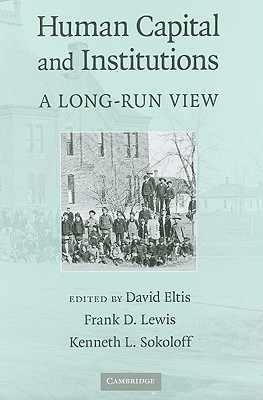

 Cambridge University Press
Cambridge University Press
Human Capital and Institutions: A Long-Run View


Key Metrics
- David Eltis
- Cambridge University Press
- Hardcover
- 9780521769587
- 9 X 5.9 X 1.1 inches
- 1.35 pounds
- Social Science > Anthropology - Cultural & Social
- English
 Secure Transaction
Secure TransactionBook Description
Author Bio
David Eltis is Robert W. Woodruff Professor Emeritus of History, Emory University. He has a Ph D from the University of Rochester, (1979).
His research interests are the early modern Atlantic World, slavery, and migration - both coerced and free. He is the author of Economic Growth and The Ending of the Transatlantic Slave Trade (New York, Oxford Univ. Press, 1987) which won the British Trevor Reese Memorial Prize, and The Rise of African Slavery in the Americas (Cambridge, 2000), awarded the Frederick Douglass Prize, the John Ben Snow Prize, and the Wesley-Logan Prize.
He is also winner of the John T. Hubbell Prize for best article in the journal Civil War History, in 2008. Currently co-editor of the Transatlantic Slave Trade database at www.slavevoyages.org, he is also the principal investigator of a two year NEH funded collaborative project on the origins of Africans pulled into the transatlantic slave trade.
This project draws on the records of 67,000 names (taken down pre-orthographically) and descriptions of Africans liberated from slave vessels in the first half of the nineteenth century. The information was extracted from the registers of international courts that were established to adjudicate vessels detained as they engaged in the transatlantic slave trade.
Source: Emory College of Arts & Sciences
Community reviews
Write a ReviewNo Community reviews




